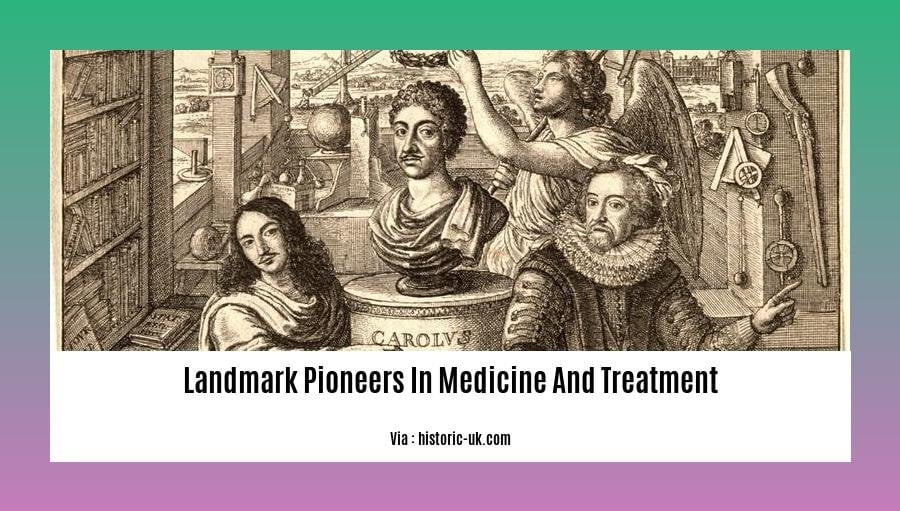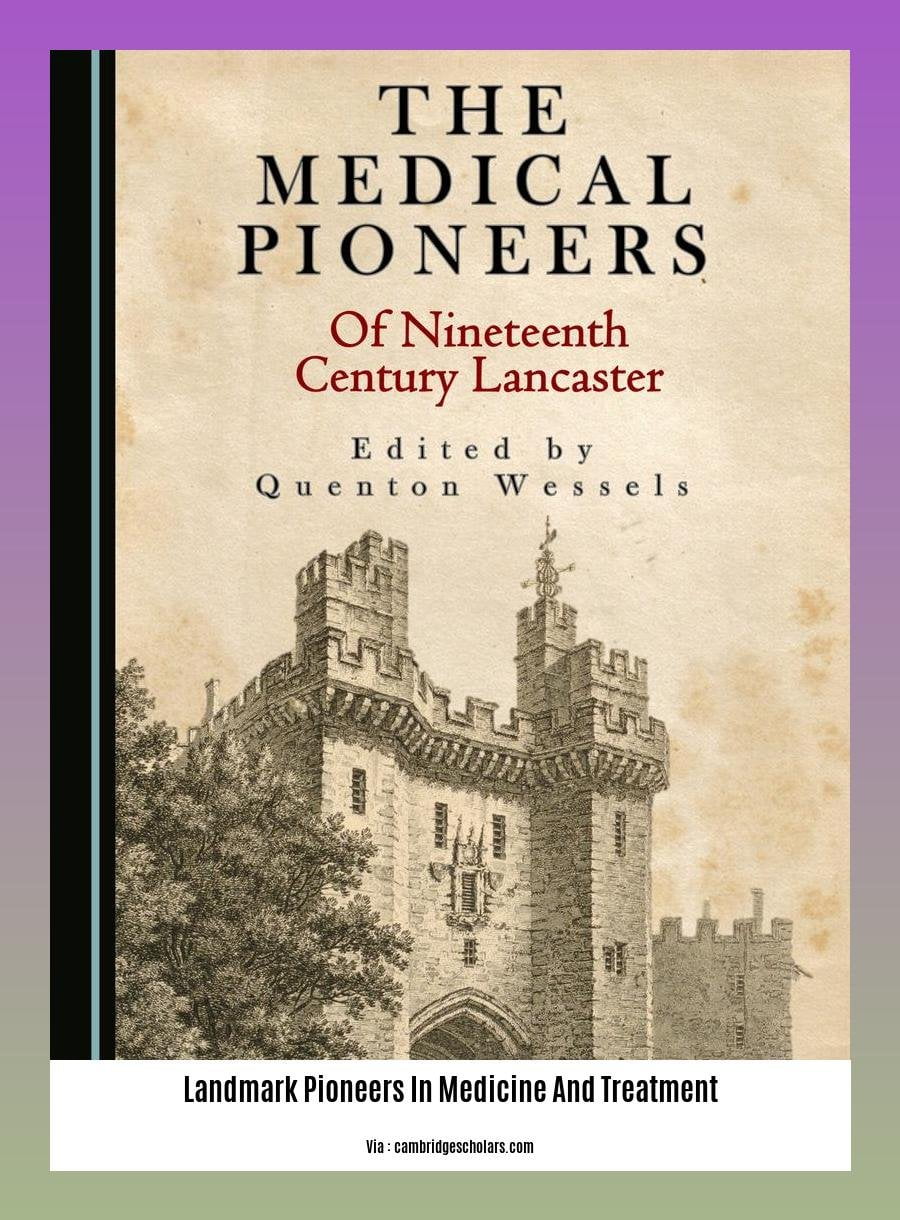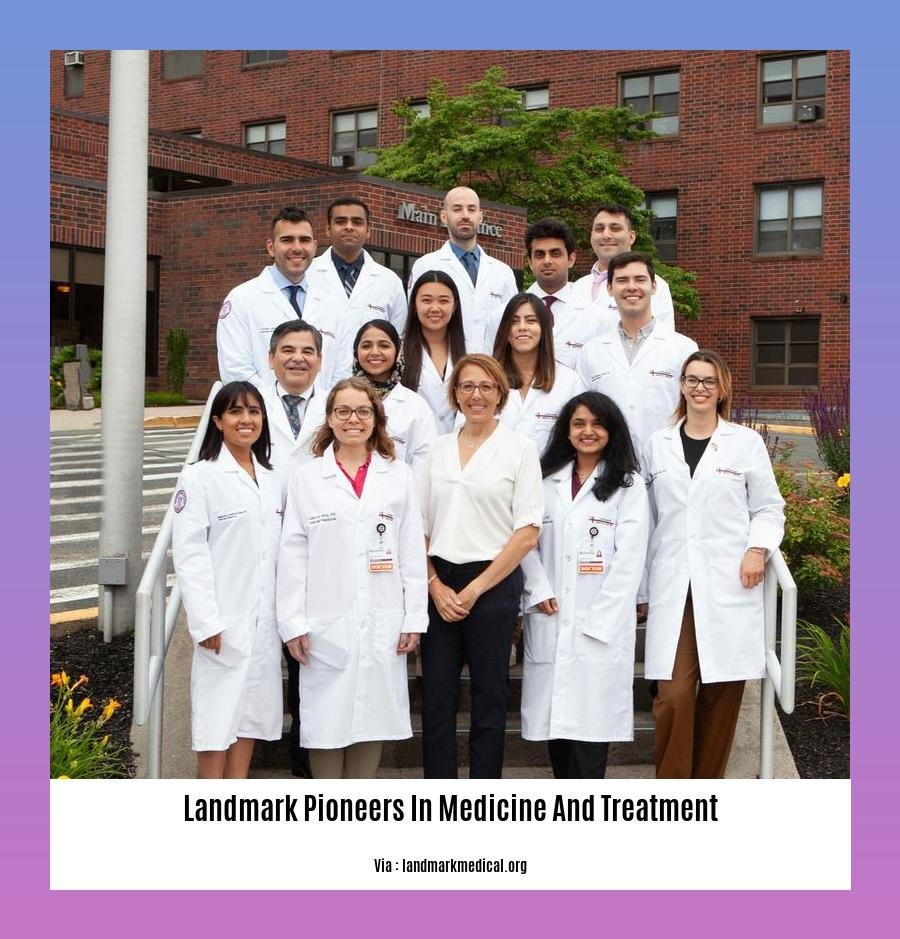Embark on a captivating journey through the annals of healthcare history with “Landmark Pioneers in Medicine and Treatment: Exploring the Lives and Contributions of History’s Healthcare Revolutionaries.” This article shines a light on the extraordinary individuals whose groundbreaking discoveries and unwavering dedication have indelibly shaped the landscape of medical practice and transformed patient care.
Key Takeaways:

- Louis Pasteur: Linked microorganisms to disease and developed vaccines.
- Alexander Fleming: Accidentally discovered penicillin, revolutionizing bacterial infection treatment.
- Elizabeth Blackwell: First U.S. female physician and advocate for women’s education and health rights.
- Wilhelm Conrad Roentgen: Discovered X-rays, enabling visualization of bones and internal structures.
- Florence Nightingale: Established modern nursing, emphasizing hygiene, sanitation, and patient care.
Landmark Pioneers in Medicine and Treatment
Breaking New Ground: Trailblazing Pioneers in Medicine and Treatment
Throughout history, landmark pioneers in medicine and treatment have played a pivotal role in revolutionizing healthcare and improving patient outcomes. These visionaries have challenged established norms, embraced innovation, and dedicated their lives to alleviating human suffering. Join us as we delve into the extraordinary lives and groundbreaking contributions of these medical trailblazers.
Louis Pasteur: Unveiling the Microbial World
Louis Pasteur, the “father of microbiology,” transformed our understanding of disease. His meticulous experiments established the role of microorganisms in causing illness, debunking the prevailing theory of spontaneous generation. Pasteur’s groundbreaking work led to the development of pasteurization, a technique that prevents spoilage by eliminating harmful bacteria in food and beverages.
Alexander Fleming: Discovering Penicillin’s Miracle
A serendipitous discovery in 1928 by Alexander Fleming changed the course of medical history. While studying a bacterial culture, Fleming noticed a mold that inhibited bacterial growth. This observation led to the discovery of penicillin, the first antibiotic, which revolutionized the treatment of bacterial infections and saved countless lives.
Elizabeth Blackwell: Breaking Barriers for Women in Medicine
Elizabeth Blackwell shattered societal norms in 1849 when she became the first female physician in the United States. Facing countless obstacles, she persevered and established a successful medical practice. Blackwell dedicated her life to advocating for women’s education and access to healthcare, leaving an enduring legacy of promoting gender equality in medicine.
Wilhelm Conrad Roentgen: Unveiling the Invisible
A chance encounter with an X-ray tube in 1895 led Wilhelm Conrad Roentgen to make an extraordinary discovery: X-rays. This groundbreaking technology allowed physicians to visualize bones and internal structures, transforming medical diagnostics and enabling the detection and treatment of various diseases.
Florence Nightingale: The Pioneer of Modern Nursing
Known as the “Lady with the Lamp,” Florence Nightingale revolutionized the field of nursing during the Crimean War. Her unwavering commitment to hygiene and sanitation drastically reduced mortality rates among wounded soldiers. Nightingale’s influence extended beyond the battlefield, as she established nursing schools and advocated for improved healthcare practices.
These landmark pioneers in medicine and treatment serve as beacons of inspiration for medical professionals and patients alike. Their unwavering dedication, relentless curiosity, and innovative spirit have profoundly impacted our healthcare system and continue to shape medical practices to this day. Let us celebrate their remarkable legacies and honor their invaluable contributions to improving human health and well-being.
If you’re interested in the inspiring stories of innovators and pioneers in the medical field, look no further. These brilliant minds have revolutionized healthcare, making significant contributions to the medical advancements we enjoy today. From the groundbreaking healthcare innovators who pushed the boundaries of medical science to the medical pioneers whose breakthroughs saved lives, their stories are a testament to the human spirit’s resilience and determination.
Trailblazers in Surgical Techniques: From Antiquity to Modern Day
From the ancient Egyptians’ skillful wound care to the modern marvels of robotic surgery, the evolution of surgical techniques has been a transformative journey. Join us as we uncover the Trailblazers in Surgical Techniques: From Antiquity to Modern Day, whose groundbreaking innovations have revolutionized patient care.
Key Takeaways:
- Ancient Egypt: Honey and linen dressings promoted healing.
- Hippocrates (460-377 BCE): Emphasized observation, cleanliness, and hygiene.
- Joseph Lister (1827-1912): Pioneered antiseptic techniques, revolutionizing surgery.
- 20th century: Advancements in antibiotics and tissue regeneration improved surgical outcomes.
Ancient Pioneers of Wound Care:
- Ancient Egyptians (c. 1500 BCE): Masters of wound care, employing honey as an antiseptic and linen dressings to promote healing.
- Hippocrates (460-377 BCE): The father of modern medicine, stressed the importance of observation, cleanliness, and dietary hygiene in wound management.
Medieval Herbal Healers:
- During the Middle Ages, wound care focused on cauterization and herbal remedies, with limited advancements.
Renaissance Revival:
- Renaissance (16th-17th century): A resurgence of interest in anatomy and the scientific study of wound healing.
Birth of Modern Surgery:
- 18th century: Anesthesia and antisepsis transformed surgery into a safer and more precise practice.
Antiseptic Pioneer:
- Joseph Lister (1827-1912): Revolutionized surgical practices by pioneering the use of antiseptic techniques, reducing infection rates and saving countless lives.
Modern Surgical Advancements:
- 20th century: Antibiotics, tissue regeneration, and robotic surgery have further improved surgical outcomes.
Most Relevant URL Source: A Brief History of Wound Care
Pioneers of Medical Research: Unveiling the Secrets of Disease
Let’s rewind through history and shine a light on the Pioneers of Medical Research: Unveiling the Secrets of Disease. They were pioneers who bravely ventured into medical mysteries, fueled by relentless curiosity and an unwavering desire to understand and conquer diseases that plagued humanity.
Key Takeaways:
From the earliest recorded clinical trial of legumes in biblical times to the groundbreaking discovery of penicillin in 1928, medical research has evolved amidst challenges.
Edward Jenner’s development of the smallpox vaccine in the 18th century marked a turning point in disease prevention.
Raymond Damadian’s demonstration of MRI’s potential in 1970 revolutionized medical diagnostics.
Throughout history, pioneering researchers have faced skepticism and resistance, yet their determination has led to countless medical advancements that have improved our understanding of diseases and transformed healthcare.
Most Relevant URL Source:
Evolution of Clinical Research: A History Before and Beyond…
Influential Women in Medicine: Breaking Barriers and Reshaping Healthcare
In the annals of medical history, the contributions of women have often been overlooked. But their tireless efforts and unwavering dedication have played a pivotal role in shaping healthcare as we know it today. From pioneering advancements to breaking down societal barriers, these influential women in medicine have left an extraordinary legacy, inspiring generations to come.
Key Takeaways:
- Women have overcome significant obstacles to enter and excel in the medical field.
- Their groundbreaking discoveries and innovations have revolutionized patient care.
- Despite progress, gender bias and discrimination persist, hindering women’s full potential in medicine.
- Promoting equity and inclusion is crucial for a diverse and thriving healthcare workforce.
- Women continue to make invaluable contributions to medical research, diagnosis, and treatment.
Trailblazers in Medicine
- Elizabeth Blackwell (1821-1910): The first female physician in the United States, known for her advocacy for women’s education and health access.
- Virginia Apgar (1909-1974): Created the Apgar score, used to assess newborn health, significantly improving infant mortality rates.
- Rosalind Franklin (1920-1958): Played a crucial role in discovering the structure of DNA, paving the way for genetic research.
- Gertrude Elion (1918-1999): Won the Nobel Prize in Medicine for developing drugs to treat leukemia and other diseases.
- Christiana Figueres (1956- Present): Environmental scientist and former executive secretary of the UN Framework Convention on Climate Change.
Overcoming Challenges
Throughout history, women in medicine have faced numerous barriers, including gender bias, discrimination, and lack of opportunities. They have had to navigate a male-dominated field and prove their worth through exceptional accomplishments. Despite these challenges, they have persevered, using their voices to advocate for change.
Impact on Healthcare
The contributions of women in medicine have had a profound impact on patient care and medical advancements. They have developed lifesaving treatments, improved patient outcomes, and promoted health equity. Their work has opened doors for future generations of women in medicine, inspiring them to pursue their dreams and make a difference in the world.
The Path Ahead
While significant progress has been made, gender inequality in medicine persists. To ensure a truly equitable and inclusive healthcare workforce, we must address systemic biases, promote mentorship and support for women, and encourage their leadership. By empowering women in medicine, we empower healthcare itself.
Most Relevant URL Source
– Women in Medicine: Breaking Barriers and Reshaping Healthcare

FAQ
Q1: Who was the first female physician in the United States?
A1: Elizabeth Blackwell
Q2: What groundbreaking discovery did Alexander Fleming make in 1928?
A2: The discovery of penicillin
Q3: Who is known as the father of modern nursing?
A3: Florence Nightingale
Q4: What did Louis Pasteur establish about microorganisms?
A4: Their role in disease
Q5: What invention revolutionized the visualization of bones and internal structures?
A5: X-rays discovered by Wilhelm Conrad Roentgen
















